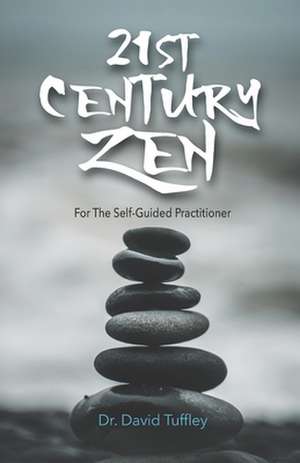21st Century Zen
Autor David Tuffleyen Limba Engleză Paperback
21st Century Zen + Notebook. Zen is a way of life rather than an ideology; a way of life that transcends dualistic everyday thinking to reach satori (enlightenment), a state of mind in which the oneness of all things is experienced. This is our original state of mind that becomes overlaid by the strategic egoic thinking that perceives the world in adversarial terms, of "us and them", a world of separate entities that compete for survival. Zen goes beyond the sense of self as a separate entity in the world to reach a non-dualistic perspective. One is no longer a drop in the ocean, but the whole ocean in a drop. This state is sometimes called 'buddha-nature'. It lies at the core of our being. The challenge is to retrace our steps all the way back to that state of mind, our original nature. To do this we must dig down through the accumulated layers of cultural conditioning and acquired sense of personal identity as a separate person in the world with a name, a title and a life story. All those cherished possessions that people labour their whole lives to acquire and which they would no more willingly divest themselves of than they would think to cut-off their own arm. And yet, this is the challenge of Zen.
MethodsThere are two basic ways to practice Zen; sitting meditation, known as shikan taza, and kōans. Kōans are a short passage that is expressed as a paradox that cannot be solved through logic, but which requires a person to break through the logical barrier of ego-consciousness. Societies accept this paradigm as being true to provide the foundation upon which society operates. A kind of 'consensual reality' that is commonly agreed to be real and which people rarely if ever question. The second method, 'just sitting' or sitting meditation is practiced in conjunction with a breathing regime known as 'observation of breath count'. It is meditation to the exclusion of egoic thinking. Heightened awareness without the mental chatter. No worries, no desires just pure conscious awareness.
Origins. Zen came about in China during the Tang Dynasty (618-907) as Chan Buddhism. It blends Mahayana Buddhism with the ancient Chinese philosophy of Taoism with its deep reverence for Nature. Other influences include the Yogācāra and Mādhyamaka philosophies. Chan Buddhism arrived in Japan during the 6th Century as part of a diplomatic mission. Zen involves meditative practices (zazen) that helps a person towards enlightenment through the paradoxical realization that they are already enlightened. It is remembering and re-establishing one's original nature in daily consciousness. Therefore, it is a process of taking away, not adding; an idea that is counter-intuitive to products of a Western education who are accustomed to the additive form of learning. 21st Century Zen is a distillation of the basic underlying truths that are the enduring foundation of this ancient tradition, expressed in the simple, modern English spoken and understood by people not familiar with ancient Chinese and Japanese modes of expression. Some might object that this account departs from the purity of the centuries-old teachings. Those original texts are easily obtainable. Great effort has been made to preserve the essential meaning of the original, and express it in modern language. Ultimately, the outward form that a message takes is less important than the underlying meaning. It might be instructive to read both this and the older forms and compare them for fidelity to the original.
Preț: 105.56 lei
Nou
20.20€ • 21.60$ • 16.84£
Carte tipărită la comandă
Livrare economică 17 aprilie-01 mai
Specificații
ISBN-10: 1539018350
Pagini: 252
Dimensiuni: 140 x 216 x 14 mm
Greutate: 0.37 kg
